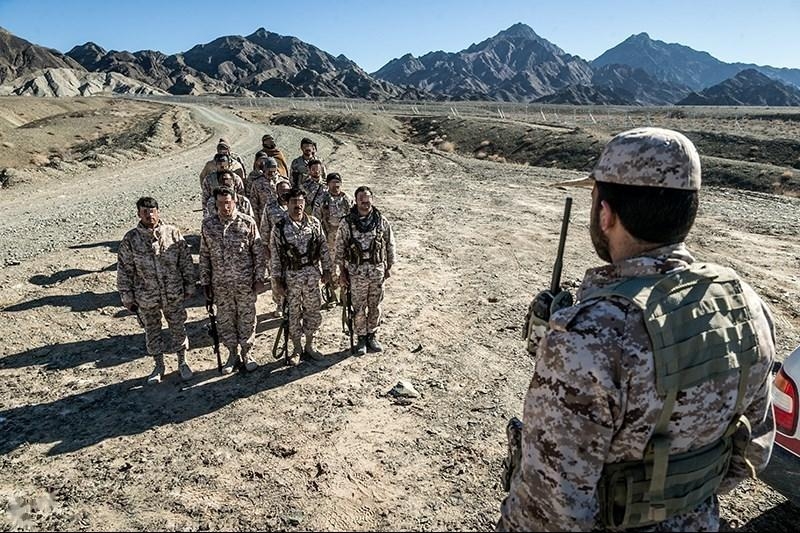 Western intelligence officials say a new Iranian terror network has been established in Africa on the orders of Qassem Suleimani, the head of the Quds Force, the elite section of Iran's Islamic Revolutionary Guard Corps (IRGC) that has responsibility for overseas operations. Pictured: Members of Iran's IRGC "Ground Force Commandos". (Image source: Tasnim/Wikimedia Commons) |
As Iran intensifies its efforts to establish a global terror network, new evidence has emerged that highlights the regime's attempts to establish a terrorist infrastructure in Africa.
Western security officials claim the Iranian initiative in Africa has been launched in response to the Trump administration's decision to withdraw from the controversial nuclear deal signed between Tehran and the world's leading powers in 2015.
The objective of the African-based terror network, Western security officials say, is to establish a group of so-called "sleeper cells" that can be activated to attack Western targets if tensions between Iran and the West result in a serious escalation in hostilities. US, British, French and other Western bases in the region are the most likely targets for future terrorist attacks, and a number of Western governments are understood to have responded by ordering their military and diplomatic missions in the region to upgrade security arrangements.
The discovery of the African network follows recent revelations of Iran's attempts to expand its terror network in Europe, as well as other parts of the globe including Latin America and the Middle East.
Intelligence officials say the new terror network has been established on the orders of Qassem Suleimani, the head of the Quds Force, the elite section of Iran's Islamic Revolutionary Guard Corps that has responsibility for overseas operations.
The Iranian cells are said to be active in a number of African countries including Sudan, Chad, Ghana, Niger, Gambia and the Central African Republic.
As one senior Western security source recently told me, "Iran is setting up a new terrorist infrastructure in Africa with the aim of attacking Western targets. It is all part of Tehran's attempts to expand its terrorist operations across the globe."
Intelligence officials say Iran has been working on the new terror network for the past three years since signing the nuclear deal on freezing its uranium enrichment activities with the US and other major world powers in 2015.
The operation is being organised by Unit 400, a highly specialised section of the Quds Force which is run by Hamed Abdollahi, a veteran Revolutionary Guard officer who, in 2012, was designated by the US as supporting terrorist activity. Overall command of the African cell is said to be run by Ali Parhoon, another senior Iranian officer in Unit 400.
Details of the terror cell's existence were uncovered following a series of arrests in Chad in April. Investigators found that Iran was behind the recruitment and training of men between the ages of 25-35 with the aim of committing terror attacks against Western targets on the continent.
There are estimated to be around 300 militants who have been recruited by the Revolutionary Guard and have undergone rigorous training at Iranian-run training camps in Syria and Iraq. The last batch of recruits were trained at an Iranian base in the southern Iraqi city of Najaf.
Iran's attempts to establish a new terror operation in Africa follow recent revelations that British security officials caught terrorists linked to Iran stockpiling tonnes of explosives on the outskirts of London. The British authorities believe this cell was also set up in 2015 after Iran signed the nuclear deal.
Last month, The Jerusalem Post, quoting from an intelligence report from the German state of Hesse, claimed that Iran was one of the main state actors involved in espionage in Germany. It said Iran was involved in the illicit procurement of technology for weapons of mass destruction.
The revelation that Iran is setting up a new terror network in Africa comes at a time of rising tensions between Washington and Tehran, and Iran's decision to resume work on enriching uranium, a key material in the production of nuclear weapons. Tehran also has been accused of stoking tensions in the Gulf after Revolutionary Guard commanders confirmed that they were responsible for shooting down a US military drone operating close to the Strait of Hormuz. In addition, Iran has been blamed for carrying out attacks on a number of oil tankers operating in the Gulf that were damaged by mines.
Con Coughlin is the Telegraph's Defence Editor and a Distinguished Senior Fellow at Gatestone Institute. He is the author of "Khomeini's Ghost".


